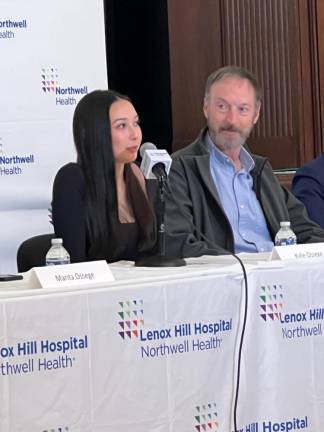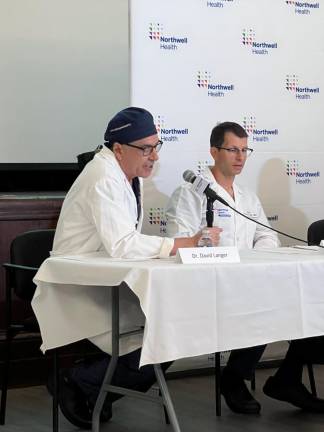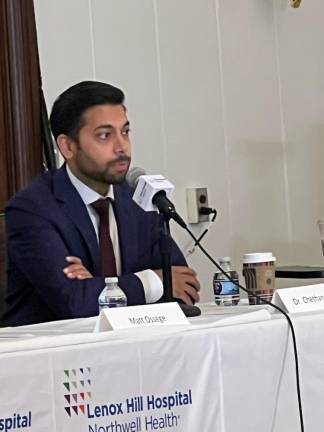Michigan School Shooting Survivor Reflects on Life-Changing Surgery at Lenox Hill
Kylie Ossege survived being caught in the crossfire of the November 30, 2021 school shooting at Michigan’s Oxford High School, narrowly avoiding paralysis due to emergency surgery and rehabilitation. She was 17 at the time. Four of her schoolmates died. Now, after an additional July 23 surgery this year at Northwell’s Lenox Hill Hospital, Ossege has been given a positive prognosis. She was joined by her surgeons and parents for a November 21 press conference on the UES.



A girl that narrowly survived the nightmarish November 30, 2021 mass shooting at Michigan’s Oxford High School came to the UES almost exactly two years later, where she held a November 21 press conference with her parents and the Lenox Hill surgeons that greatly improved her quality of life. The director of Northwell Health’s Center for Gun Violence Prevention–which covers Lenox Hill–was on hand as well.
Kylie Ossege, who had been 17 at the time of the shooting, appeared extraordinarily brave as she recounted the traumatic events of that day. She had been indiscriminately shot by a fellow teenager wielding a semi-automatic 9mm handgun, after all, caught up in a rampage that left four of her schoolmates dead.
“The bullet went through my right clavicle and out the left side of my back. I fell to the floor...I couldn’t feel my legs. At the time, I didn’t know it, but my spine was affected. I was laying in the school helpless for about 15 minutes. It felt like the longest 15 minutes of my life. I couldn’t do anything. I didn’t want to yell, I didn’t want to do too much to possibly injure myself more,” Ossege recalled.
She spent nearly two months overall at St. Joseph’s Hospital recovering, after having a hematoma and shards of shattered bone removed during emergency surgery. Pieces of clothing, which had entered into her body along with the bullet, were also taken out. A titanium plate was inserted into her clavicle. After being discharged by the ICU, she spent six weeks in a rehab unit.
Ossege elaborated on what exactly rehab entailed: “I had to learn how to shower by myself. Standing up and down was a big test...getting out of bed, brushing my teeth, doing my makeup. All these simple things that people take for granted, I had to relearn again.”
In fact, she added that the help she received during this time has inspired her future career choices. Ossege, who is now studying at Michigan St., wants to be an occupational therapist.
Her parents, Matt and Marita, sat on either side of her while she relived her harrowing experiences. They appeared exhausted, taking brief turns at the mic to speak of the “blessings” Kylie’s doctors had provided her with.
However, lasting medical problems remained. Her C6 and T6 vertebrae near the top of her spine were dangerously separated, threatening to tilt her head forward. She had put off additional surgery, she said, because “she was moving into a big university as a freshman.”
Lenox Hill Hospital rectified this on July 23 of this year. David Langer, MD (the popular face of the “Lenox Hill” Netflix show, and the chair of neurosurgery at the hospital) had been put it touch with Ossege about that operation. He told the press that he’d sent her films about what the procedure would entail, and managed to convince her of the quality-of-life improvements it would provide.
Addressing Kylie, Langer remarked that ”the honor is ours that you choose to come here. We’re lucky to be able to take care of people like you. You’re obviously an incredibly unique young woman.”
John Cardi, MD, performed the surgery. He explained that “we had to do a pretty aggressive surgery. She’s done remarkably well. I don’t think this is ultimately going to cause any problems in the future.” He pointed out her obvious fortitude.
Outside of the nitty-gritty of the surgery, however, the participants spoke about what they hoped public exposure would accomplish. Langer, for one, expressed outrage that it felt harder to unlock his phone passcode than to purchase a gun. Getting emotional, he later added that “this is what life’s about. That’s why John [Cardi] does what he does. We all hate guns. What Kylie’s doing is a testament to what you can do you overcome an obstacle.”
Dr. Chethan Sathya, a pediatric trauma surgeon and the director of Northwell Health’s Center for Gun Violence Prevention, gave a broader context for what happened to the Ossege family. Asked if school shootings were a public health emergency, he didn’t hesitate: “Absolutely. If it’s not a public health emergency, why is it killing so many kids in this country?”
Sathya was clear that he believed a response would not be political, but within the realm of health reform. “There are solutions that work. Firearm safety counseling, from a patient to a doctor. Violence prevention. These things are evidence-based,” he stated.
Kylie Ossege, however, was clear that her motivation for spreading her story was personal: “The four kids that were killed at my school–Madisyn Baldwin, Hana St. Juliana, Justin Shilling, and Tate Myre–they’re a huge drive for me. All four of them were amazing individuals. I feel like I can talk to them every day, and I know that this is what they’d want me to be doing. They would want me to take care of myself. They would want me to spread positive things. They would want met to advocate for safer gun laws and gun violence prevention.”